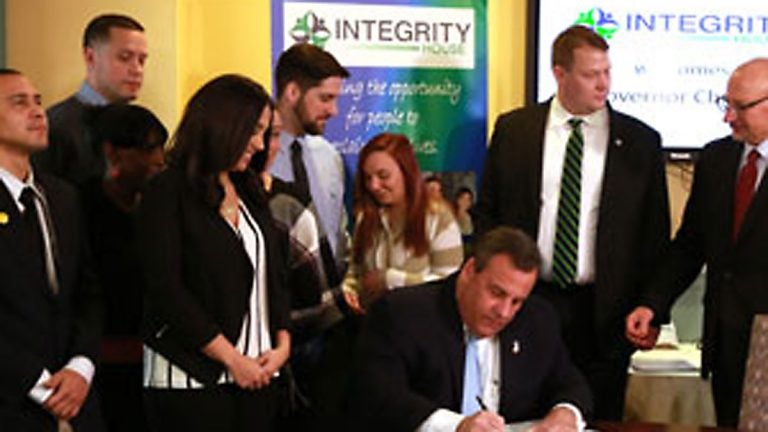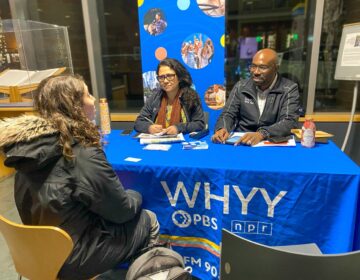Christie signs executive order to boost opioid treatment efforts

Credit: Governor's Office/Tim Larsen
Gov. Chris Christie signed an executive order Tuesday that declared opiate addiction a “public health emergency” in New Jersey and codified many of the proposals he outlined last week, including a task force of state officials charged with reducing red tape and crafting a “comprehensive, coordinated strategy to combat … drug abuse.”
But some experts insist these measures are largely too little, too late.
While the Republican governor has received widespread praise for using his annual State of the State address to focus attention on the opiate epidemic, observers have questioned the basis and efficacy of certain priorities — like his insistence on mandatory insurance coverage for up to six months of inpatient drug treatment, which they said is rarely clinically appropriate.
Others have wondered why Christie omitted critical items, like protocols for expanding highly effective medication-assisted treatments or a strategy for protecting the federal Affordable Care Act. The governor conceded that the ACA covered drug treatment for nearly 14,360 patients last year — five times the number covered in 2013, before it took effect; the law faces a threat of repeal under the Republican-led Congress and President-elect Donald Trump.
But the most common criticism of Christie’s plan is, essentially, “what took him so long?” The federal Centers for Disease Control and Prevention declared in February 2011 that overdoses from prescription opioids had become an “American epidemic.” A 2014 report from the Governor’s Council on Alcoholism and Drug Abuse recommended many of the items he outlined in his speech last week and Sen. Joseph Vitale (D-Middlesex) termed addiction a public health crisis when he announced a 21-bill package to address the epidemic that fall.
“This isn’t something that’s a passing healthcare fad or a flu bug that comes and goes every year, this is an everyday crisis for thousands of New Jerseyans,” with significant human and financial costs that deserve a comprehensive response, Vitale told NJ Spotlight in early 2015, when Christie — after six months — had signed three of the five bills approved by lawmakers. (These laws required annual reports on state addiction programs; extended immunity to healthcare professionals who render treatment to addicts; and directed state officials to better plan and coordinate inmate care.)
Christie devoted at least two-thirds of his January 10 address to the state’s addiction crisis, making a passionate plea for greater public understanding and outlining plans to reduce the availability of addictive pills, expand options and insurance coverage for treatment, and help those who got clean to stay drug-free. Some 28,000 New Jersey residents sought treatment in 2015 while thousands more were wait-listed or turned away — and 1,600 died from the disease, a 22 percent increase over 2014 mortality figures.
A week later, Christie joined a handful of addicts in recovery at Integrity House, in Newark, to sign Executive Order 219, which reiterated many of his State of the State pledges and filled in some details regarding the Governor’s Task Force on Drug Abuse Control.
That group will include the state Attorney General and leaders of the departments of health, human services, child welfare, corrections, education, and banking and insurance; Christie chose Charlie McKenna, executive director of the New Jersey Schools Development Authority, to chair the panel. It is tasked with identifying current barriers to effective treatment and working with local, federal and private entities to craft a coordinated, comprehensive plan to address the epidemic across state government. (Executive orders have the force of law and may remain in force indefinitely.)
“We must take aggressive action to get this insidious crisis under control so I am calling together all resources of state government in order to save lives,” Christie said Tuesday. “The human cost of this epidemic is incalculable, impacting every part of life in New Jersey, affecting our education system, our health care system, public safety and the financial security of every person it touches.”
State lawmakers in both political parties joined a number of treatment advocates in lauding the governor’s commitment to reducing addiction following the State of the State address. But in the days that have followed, insurance leaders and physicians have raised concerns about his key proposals and experts have compiled a growing list of questions about what he chose to include in his last annual address before leaving office — and what he left out.
The governor’s office has declined to respond to questions seeking more detail about his proposals or to offer citations on certain specifics he included in the speech. (For example, experts question his assertion that “evidence” shows that a child who tries any drug by age 13 has a 70 percent probability of developing an addiction by age 21. Experts were unfamiliar with this finding and the CDC was not aware of any data relating to this claim.)
Other observers noted that many of Christie’s proposals have already been debated, if not approved, by the Legislature in recent years. “This is something we’ve been championing for years and years and years,” Assemblyman Gary Schaer, (D-Bergen), said last week, while also praising the governor’s commitment to the cause. Democratic leaders in both houses, including Sen. Loretta Weinberg, (D-Bergen), have urged Christie to devote more attention to preserving the ACA, which has extended protection to some 700,000 New Jersey residents and required insurance coverage to provide certain substance abuse benefits to millions more.
Roseanne Scotti, New Jersey director for the national Drug Policy Alliance, was particularly troubled by the absence of any reference to medication-assisted treatment, in which doctors oversee the use of drugs like methadone or buprenorphine which prevent an addict from getting withdrawal-sick, but don’t provide a high like heroin or opiates. “It’s a speech about opioid addiction and medication-assisted treatment is the gold standard,” she said, noting there are decades of research on how this strategy is an important aspect of treatment for many patients.
“We need to be reducing the barriers for people getting into medication-assisted treatment,” she said. “I was very disappointed that this wasn’t one of the focuses of the speech.”
Vitale welcomed the governor’s efforts and pledged to work with him on several issues. But he agreed medication-assisted treatment is often “essential in assisting a patient in returning to work, school and functioning at a productive level,” while guarding against overdose. “We have already established a working group of experts to analyze the crisis, to review the resources that are in place and to study the evidence on the most effective ways to address the problem,” Vitale added. “We also adopted a law requiring substance abuse education in the schools. We will work with the governor to make sure that all our efforts are employed effectively.”
Others have suggested that Christie’s passion for the issue of addiction reflects the fact that the disease — once viewed as an inner-city affliction — is now impacting white, suburban families at higher rates. Christie’s stance on addiction became national news in 2015, thanks largely to a viral video of a story he told during a presidential campaign stop in New Hampshire, when he discussed the pain associated with losing a college pal and fellow attorney to drugs and alcohol. Christie retold the story during his State of the State and also described the trials of a young addict, A.J. Solomon, the son of a prominent political couple.
“Who is A.J.? He is A.J. Solomon, the son of BPU Commissioner Dianne Solomon and New Jersey Supreme Court associate justice Lee Solomon. Two extraordinary citizens. Two extraordinary parents,” Christie said last week.
Christie’s approach raised questions for several lawmakers who represent urban districts in New Jersey and urged him to ensure solutions that balance the needs of city and suburban residents. “Addiction covers all paths, all walks of life,” Shavonda Sumter (D-Passaic) stressed at a press conference following the State of the State.
Assemblyman Jerry Green, (D-Union) noted at that event that drugs are nothing new in his district and he urged the governor not to ignore policing and prevention as he focused on recovery. He said Christie’s stories of impacted families “are very touching,” but “In the urban community, it has become a way of life, in terms of making a living.”
“When you’re talking curing, I’m all supportive,” Green said, but he wondered why the governor had chosen to focus on the issue now. “Because now it’s in our suburban communities and that’s why it’s getting a lot of attention,” Green said, adding, “Since we care, let’s care about everybody.”
___________________________________________
NJ Spotlight, an independent online news service on issues critical to New Jersey, makes its in-depth reporting available to NewsWorks.
WHYY is your source for fact-based, in-depth journalism and information. As a nonprofit organization, we rely on financial support from readers like you. Please give today.




